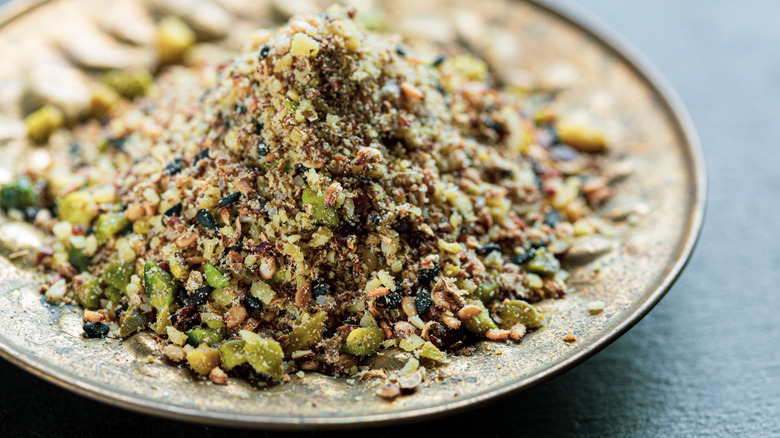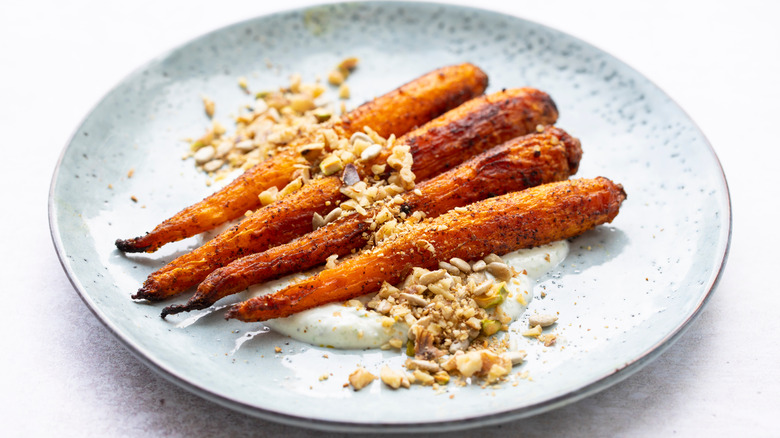This Little-Known Trader Joe's Spice Blend Is A Hard-To-Find Must-Have
When it comes to affordable, flavorful spice blends, Trader Joe's is an obvious star of the market. From its iconic Everything but the Bagel blend to the herbaceous Green Goddess seasoning, the mixes are a fantastic shortcut to adding more punch to your recipes. One extremely versatile, tasty mixture tends to fly under the radar, however: Trader Joe's Dukkah Nut and Spice Blend. A concoction of nuts, seeds, and spices, dukkah is a Middle Eastern cooking staple. Slightly different from its spice cousin za'atar, which contains herbs like thyme and oregano, sumac, and sesame seeds, classic dukkah tends to include hazelnuts, sesame seeds, and coriander, but recipes vary. Trader Joe's Dukkah is a mix of almonds, sesame seeds, fennel, coriander, anise, and salt. It has a warm, nutty flavor profile, but also a touch of sweetness from the licorice-like anise. Overall, it's a taste and texture spice bomb.
With a unique ability to be everything from a crunchy topper for bread and olive oil, to a savory rub for meats, this earthy blend is a must-have in your pantry — that is if you can find it. Unfortunately, while it has carried dukkah in the past, it seems it's not currently in stock at Trader Joe's stores, nor is it available to order on Amazon. Some fervent fans of Trader Joe's Dukkah are demanding the spice return to shelves. And, it seems the store has listened in the past, as it has previously been made available on and off. So, who knows, it may just be on a Trader Joe's shelf near you soon.
This spice blend has a rich history
Dukkah is certainly not exclusive to Trader Joe's, nor is it new. In fact, it has been around for centuries. The Arabic word "dukkah" actually means to pound, which refers to how the blend is traditionally made using a mortar and pestle. The spice blend first originated in Ancient Egypt, in the middle of a major spice route. People had access to exotic spices and combined them to make the first dukkah. The culturally unifying recipe made for a delectable mixture that was enjoyed by everyone from pharaohs to commoners.
Dukkah has come a long way since its original form. With roots spreading all over the Middle East, many different cultures have created their own variations. Some swap the hazelnuts for pistachios or add black peppercorns into the mix to give it a slightly more savory hint, overpowering the sweetness of the anise. For example, Egyptian-style dukkah often includes toasted sesame seeds and peanuts. The recipe can also be adjusted seasonally, with the addition of pumpkin seeds in the fall or cinnamon in winter.
Dukkah's endless uses
Although most widely known to be enjoyed with bread and olive oil, dukkah can really be whatever you want it to be in the kitchen. Similar to Trader Joe's Everything but the Bagel seasoning, you can sprinkle dukkah on a variety of dishes. Elevate something as plain as yogurt or roasted vegetables to add savory-sweet goodness and a nice crunch. It's a great way to enhance a dip like store-bought hummus or yogurt-based labneh, giving the creamy blends a nice variation in texture. It's also exceptional on something as simple as a poached egg with avocado on toast. Additionally, dukkah is fantastic as a dry rub on a nice cut of steak, lamb, or chicken, giving your protein a flavorful crust.
You might be out of luck when it comes to grabbing this spice blend at Trader Joe's for the time being, but it's likely available at any local Middle-Eastern market. If you don't have access to one, Private Selection, a generic brand carried in Kroger grocery stores, has its own Egyptian-inspired Dukkah Blend Seasoning. Even better, dukkah is fairly easy to make at home. Toast up all of your nuts in the oven, then transfer to a skillet and add your spices. No mortar and pestle to crush it all up? No problem, a food processor will do just fine. And that's really all it takes to stock this delectable, versatile spice blend in your pantry for up to two weeks.


